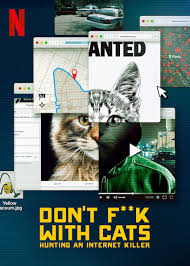
 (3 / 5)
(3 / 5)
The Netflix true crime mini-series Don’t F**k with Cats is not a documentary. If you expect a documentary exploring the who, what, how, and why of a crime, you will be disappointed. You will also miss what Don’t F**k with Cats is all about. The show is about the porous boundary between reality and social media. It’s about us watching videos created for social media, the reality behind the videos, and how real social media are in bringing people together to act in ‘real’ life. The weakness of the show is that director Mark Lewis is not fully aware of that.
Don’t F**k with Cats follows is a bunch of amateur sleuths investigating a killer. It is an entertaining and disturbing Miss Marple on Facebook. Gripping, fun, and shocking, but showing little awareness of what true crime is about and spoiling it all by blaming the audience for being voyeurs. The show fails to grasp the relationship between reality and cyber-reality, how social media make us actors not mere audience.
It begins when a shocking video of a young man killing a couple of kittens is posted online. Facebookers in horror, anger, and condemnation. Then Deanna Thompson, a data analyst for a casino in Las Vegas, who uses the alias of Baudi Moovan on FB forms a group to track down the killer. Baudi and a man using the alias John Green are the key investigators of the group looking for clues in the video to identify something that might lead them to the location of the killer.
The killer is a narcissist seeking attention. When the group has taken the wrong turn, he seems to throw them a bone to get them to chase him. Does the investigation encourage the killer to commit more crimes? I personally doubt that the killer, Luka Magnotta, would have stopped killing had the group stopped chasing him. People become serial killers because they get away with crime after crime, and their crimes escalate. Don’t F**k with Cats should have included an expert commenting on this, especially given the fact that the amateur sleuths ask themselves the question.
Don’t F**k with Cats is not a documentary! It is a show playing with our curiosity while at the same time wanting to expose our thirst for blood, real blood. We are the sick people watching and enjoying the crime. Filmmakers like playing innocent (see this analysis of Vice), but if they choose to lead us in a direction, they are to blame. Not to mention the fact that they do so to profit from it. Crucially, Don’t F**k with Cats does not focus on the crime. It gives us no details of it, nor does it explore the personality of the killer.
The show focuses on the investigation. It is the investigation done by ordinary people that is engrossing. Director Mark Lewis should have had a little more awareness of the structure of his own show and how it ‘reads’ to the audience, and have spared us the preaching.
Don’t F**k with Cats fails to focus on the most interesting and socially relevant element: the investigators are ordinary people. It is us. We do not experience social media passively, like a film or TV show. We are actors. We discuss, condemn, form opinions, and influence people using mainstream and non-mainstream media. We create misinformation and spread conspiracy theories. We also collect evidence, we shine a light onto police brutality, we organise protests. All on and through social media. The old saying, ‘Police don’t solve the crime, people do’ is at the basis of Don’t F**k with Cats. It is its strength. Someone should tell the director.
